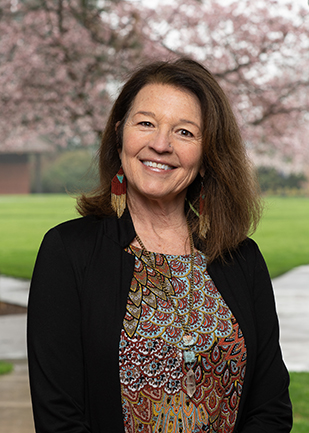 “I started in oncology one year out of nursing school and that’s where I stayed. I worked in many areas within oncology (there are many ways you can go within a specialty) and found two that really captured me: improving care for cancer-related pain and caring for people who are facing a serious illness or who are approaching the end of their life. I've integrated these experiences into teaching, and my research endeavors focus on palliative and end-of-life care education and symptoms support for persons undergoing cancer treatment.
“I started in oncology one year out of nursing school and that’s where I stayed. I worked in many areas within oncology (there are many ways you can go within a specialty) and found two that really captured me: improving care for cancer-related pain and caring for people who are facing a serious illness or who are approaching the end of their life. I've integrated these experiences into teaching, and my research endeavors focus on palliative and end-of-life care education and symptoms support for persons undergoing cancer treatment.
I've been collaborating on a quality improvement project with a local outpatient cancer clinic and recently was able to engage UP students in patient follow-up calls using evidence-based symptom guidelines. The goal is to evaluate the impact of the care patients received and use it to determine best practices.
Another area of research is in nursing palliative education. UP’s School of Nursing has done a beautiful job of integrating palliative care concepts into the nursing curriculum. The next step is to evaluate the impact of that education. I currently have three undergraduate students working with me on that.
I bring my clinical and academic background to an exciting new role leading the development of a Regional Model of Excellence in Palliative Care Education focused on schools in Idaho, Oregon, Utah, and Washington. It’s a three-year grant funded through Cambia Health Foundation and organized by the End-of-Life Nursing Education Consortium (ELNEC) at City of Hope (Dr. Ferrell) to advance palliative care nursing education. A research colleague and I are evaluating the impact of palliative care education on student learning outcomes using two tools we developed that evaluate student knowledge, behaviors, and skills in key areas.
Palliative care practice and education inspire me. Nurses engage with people during difficult times and, as educators, it is our responsibility to prepare them for that care. Wherever they practice, our nursing students will eventually confront loss, grief, and death. As a teacher, I want to encourage and inspire them to normalize this kind of care as part of their work.”
University of Portland
5000 N. Willamette Blvd.,
Portland, Oregon 97203-5798
503.943.8000
This website uses cookies to track information for analytics purposes. You can view the full University of Portland privacy policy for more information.
